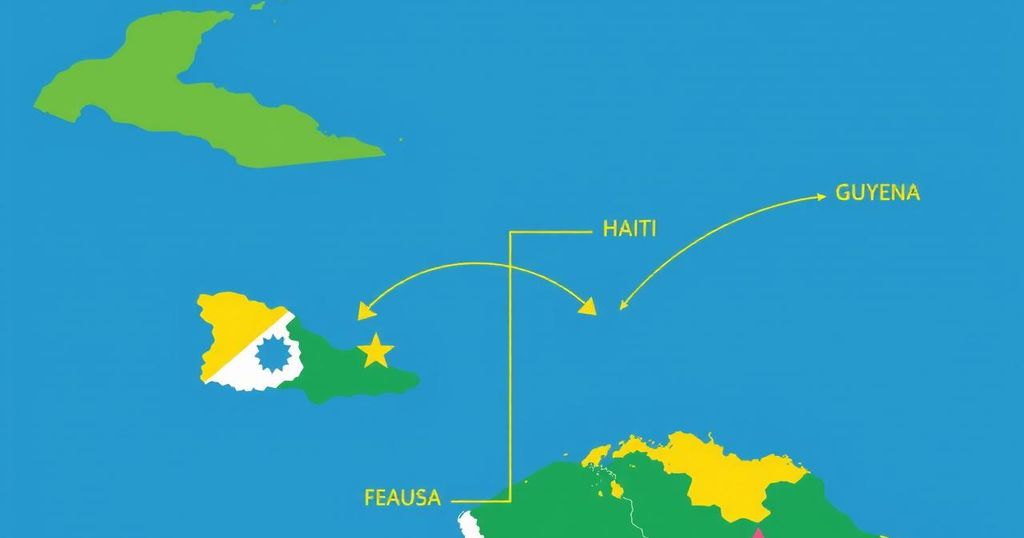Haiti has contracted Carlos Trujillo’s Continental Strategy for lobbying services to support recovery and enhance U.S. relations. Meanwhile, Guyana has also engaged the firm to strengthen ties amidst territorial disputes. Local leaders express skepticism about the effectiveness of these lobbying efforts given the current political instability and ongoing security challenges in Haiti.
The Haitian government has retained the lobbying services of Carlos Trujillo, a former Republican congressman and ambassador to the Organization of American States under President Donald Trump. Trujillo’s firm, Continental Strategy, signed a contract valued at $35,000 per month to advocate for Haiti’s recovery efforts, enhance its profile in the U.S., increase trade and investment, and support financial sector improvements.
The contract, executed by Prime Minister Alix-Dider Fils-Aimé on February 7 and filed by Trujillo on February 24, coincided with Haiti’s alignment with the U.S. and Russia at the United Nations regarding a resolution on the Russia-Ukraine war. On the same day, Trujillo also registered as a lobbyist for Guyana, which is engaged in territorial disputes with Venezuela and seeks to strengthen ties with the U.S. through a $50,000 monthly contract for six months.
Guyana’s Vice President Bharrat Jagdeo highlighted the necessity of maintaining a favorable trade environment with the U.S. given past special treatment. In contrast, Haiti’s government has not publicly clarified its objectives for hiring Trujillo’s firm amidst pressing issues such as potential cutbacks to U.S. foreign aid and uncertain funding for security missions in Haiti.
Concerns about the effectiveness of hiring lobbyists are voiced by local leaders. Sauveur Pierre Étienne emphasized the need for clarity on how the lobbyist could assist in alleviating security challenges. He expressed skepticism regarding the present government’s handling of its responsibilities.
Similarly, Julio Volcy from Haiti’s civil society argued that any lobbying agreements should be scrutinized due to the administration’s failure to deliver tangible improvements. He noted that a focus on political power rather than urgent challenges is a significant concern in Haiti.
The prime minister’s office has remained silent on the lobbying objectives. However, sources indicate that Trujillo’s primary goal is to influence U.S. involvement to secure a stable environment conducive to elections in Haiti.
Haiti’s political landscape is mired in turmoil following the establishment of the Transitional Presidential Council last year. This council has faced significant obstacles, including corruption, internal conflict, and escalating violence from gangs, leading to over a million internally displaced individuals. The current political uncertainty raises questions over the prospects of future elections, particularly as the transitional leadership may need to decide whether to extend its mandate or dissolve altogether. Recent U.S. policy changes exacerbating the situation include the termination of legal protections for approximately 500,000 Haitians and cuts to foreign assistance initiatives.
In summary, both Haiti and Guyana have engaged the services of the same lobbying firm, seeking to enhance their positions in Washington. While Haiti aims to bolster its recovery efforts and address financial issues through lobbying, local voices express concerns about transparency and effectiveness. The ongoing political instability in Haiti underscores the necessity for clear objectives and action from the government to secure its future and that of its citizens amidst external political pressures.
Original Source: www.miamiherald.com




